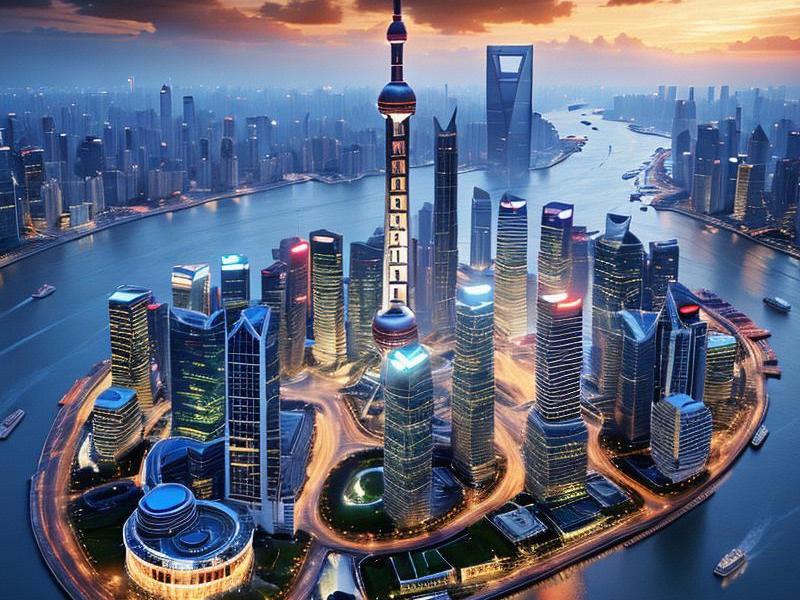This article delves into the pivotal role that Shanghai plays in the economic development of China. It explores how the city has evolved into a global financial hub, a center for innovation, and a key player in international trade, all while contributing significantly to the nation's urbanization efforts.

Shanghai, often referred to as the "Pearl of the Orient," stands as a testament to China's remarkable economic transformation over the past few decades. As the largest city in China and one of the world's most populous metropolitan areas, Shanghai's strategic location along the Yangtze River Delta has made it a natural gateway for trade and commerce. Over the years, the city has not only become a symbol of China's economic prowess but also a driving force behind the nation's rapid urbanization and modernization.
The economic significance of Shanghai can be traced back to its historical role as a major port city. During the 19th and early 20th centuries, Shanghai was one of the few ports in China that were open to foreign trade. This exposure to international markets laid the foundation for the city's economic development. After the establishment of the People's Republic of China in 1949, Shanghai underwent significant changes, transitioning from a colonial trading hub to a socialist industrial base.
In the late 20th century, Shanghai's economic fortunes took a dramatic turn with the implementation of China's reform and opening-up policies in 1978. The city was designated as one of the first Special Economic Zones (SEZs), although it did not receive the same level of autonomy as the coastal SEZs like Shenzhen and Zhuhai. Nevertheless, this policy shift marked the beginning of Shanghai's resurgence as a leading economic powerhouse.
One of the most notable aspects of Shanghai's economic development is its transformation into a global financial hub. The establishment of the Shanghai Stock Exchange in 1990 was a pivotal moment in this journey. Today, the exchange is one of the largest in Asia and plays a crucial role in facilitating capital raising and investment for Chinese companies. In addition to the stock exchange, Shanghai is home to the Shanghai Futures Exchange and the Shanghai Gold Exchange, further solidifying its position as a financial center.
上海龙凤419官网
The city's Pudong area has emerged as a symbol of Shanghai's economic ambition. Once a rural area on the eastern side of the Huangpu River, Pudong has been transformed into a modern financial district housing some of the world's tallest skyscrapers, including the iconic Oriental Pearl Tower and the Shanghai Tower. The development of Lujiazui, a central business district in Pudong, has attracted numerous multinational corporations, banks, and financial institutions, making it a global financial epicenter.
Innovation and technology have also played a crucial role in Shanghai's economic growth. The city has invested heavily in research and development, establishing itself as a hub for high-tech industries. Zhangjiang Hi-Tech Park, located in Pudong, is one of the largest and most advanced technology parks in China. It houses numerous biotech companies, IT firms, and research institutions, fostering a vibrant innovation ecosystem.
Shanghai's commitment to innovation is evident in its efforts to develop smart cities. The city has implemented various digital initiatives to enhance urban living, including smart transportation systems, e-governance platforms, and digital healthcare services. These efforts aim to improve the quality of life for residents while positioning Shanghai as a leader in smart city development.
上海品茶网
International trade remains a cornerstone of Shanghai's economy. The Port of Shanghai, the world's busiest container port, handles a significant portion of China's maritime trade. The port's efficiency and capacity have contributed to Shanghai's status as a global trade hub. In addition to its port facilities, Shanghai is home to the China International Import Expo (CIIE), an annual event that showcases the latest products and technologies from around the world. The CIIE has become a platform for China to demonstrate its commitment to opening up its market and promoting global trade.
Urbanization is another area where Shanghai has made significant strides. The city's rapid expansion has led to the development of modern infrastructure, including subways, highways, and public transportation systems. Shanghai Metro, one of the largest and most efficient metro networks in the world, serves millions of residents daily, reducing traffic congestion and improving urban mobility.
The city's urban planning efforts have also focused on creating sustainable and livable environments. Green spaces, such as Century Park and Hongkou Park, provide residents with opportunities for recreation and relaxation. Additionally, Shanghai has implemented various environmental initiatives to combat pollution and promote energy efficiency, aiming to crteeaa more sustainable urban future.
上海品茶工作室
Shanghai's economic development has not only transformed the city itself but also had a profound impact on the surrounding regions. The Yangtze River Delta, which includes Shanghai, Jiangsu, and Zhejiang provinces, has emerged as one of the most dynamic economic zones in China. The integration of these regions has facilitated the flow of goods, services, and capital, contributing to the overall growth of the national economy.
The success of Shanghai serves as a model for other cities in China and around the world. Its ability to adapt to changing economic conditions, invest in innovation, and prioritize sustainability offers valuable lessons for urban development. As China continues its journey toward becoming a global economic leader, Shanghai will undoubtedly remain at the forefront, driving progress and shaping the nation's future.
In conclusion, Shanghai's role in China's economic development cannot be overstated. From its historical significance as a trading port to its current status as a global financial hub, the city has consistently demonstrated its resilience and adaptability. Through its commitment to innovation, international trade, and urbanization, Shanghai has not only contributed to China's economic growth but also set an example for other cities aspiring to achieve similar success. As the city looks to the future, its continued focus on sustainability and global connectivity will ensure that it remains a beacon of economic prosperity and progress.